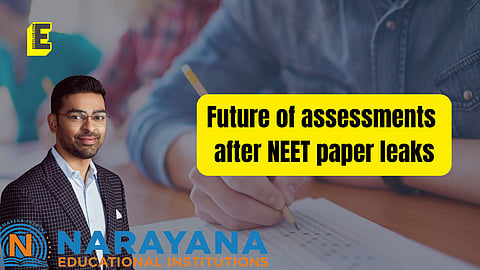

India is globally renowned for its competitive education system and the quality of students it produces year after year. In such a high-stakes environment, the recent National Eligibility cum Entrance Test undergraduate (NEET UG) 2024 paper leak, though localised, could have had far-reaching consequences for millions of students and their families.
The scandal had the potential to affect over 23 lakh students, raising serious concerns about the credibility of India's premier exam agency, the National Testing Agency (NTA), and exposing vulnerabilities in the current examination system. However, the prompt intervention of the Supreme Court helped contain the crisis.
Considering the interests of millions of students, it is essential to understand issues in the current process and come up with well thought through strategies which can prevent paper leaks thereby enabling better evaluation of student performance.
The issue here is not just about a breach in exam protocol; it is about ensuring fairness, trust, and merit in a system that plays a pivotal role in shaping students' futures.
The critical question is: Can technology, innovation, and a shift in assessment models safeguard the credibility of these high-stakes exams?
Context of the Problem
Like many other paper leaks in India, the NEET UG 2024 scandal was the result of a well-coordinated network of school officials, invigilators, and paper-solving gangs.
The Central Bureau of Investigation (CBI) report revealed that the leak occurred in centres like Oasis School in Hazaribagh. A unique serial number on the leaked paper allowed the CBI to track and uncover the scale of this malpractice.
The investigation revealed how question papers were photographed, solved, and distributed, which compromised the integrity of the exam from the outset.
While students and their families demanded the cancellation of the exam, the Supreme Court of India ruled against it, stating that the breach appeared localised to specific centres rather than being systematic enough to warrant a nationwide retest.
The court's decision highlights a need for a nuanced balance between maintaining academic schedules and ensuring fairness for all students.
Moving Forward
The future of assessments in India must embrace technology and innovation to safeguard the fairness and integrity of high-stakes exams like NEET UG. The NEET UG 2024 paper leak serves as a critical reminder that our examination systems need to evolve.
By adopting advanced security measures, exploring adaptive testing models, and integrating AI-driven monitoring, we can prevent such leaks and, more importantly, create a system that evaluates students more comprehensively.
The way forward must be rooted in continuous innovation, collaboration, and transparency. If we fail to address these systemic vulnerabilities, we risk not only the future of our students but also the credibility of our entire education system.
The challenge ahead is not just to prevent leaks but to reimagine how we assess student performance in a way that reflects both knowledge and integrity.
(Puneet Kothapa is the President of Narayana Educational Institutions. Views expressed are his own)
